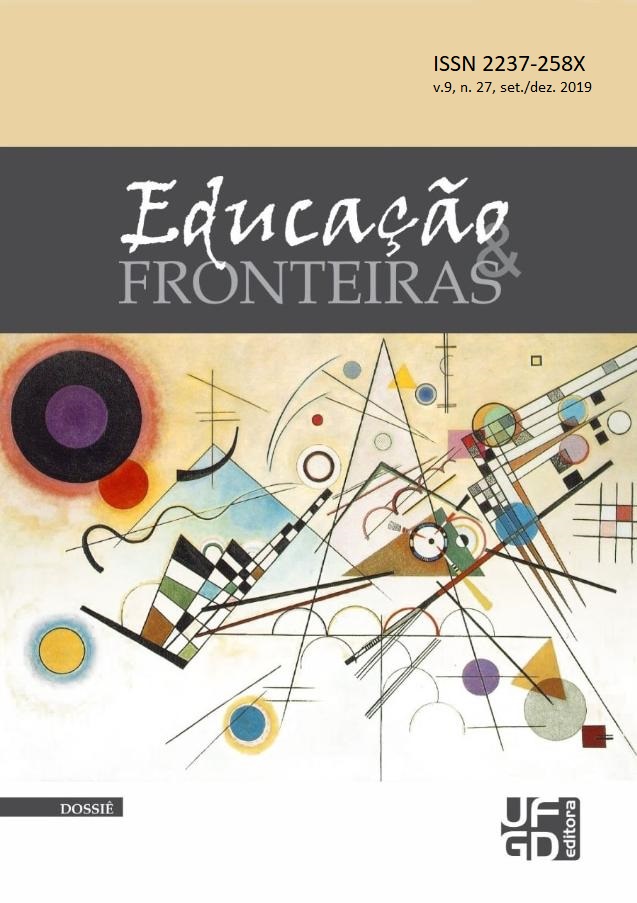Bilingual education for deaf children: deafness as an experience and childhood as a potency
DOI:
https://doi.org/10.30612/eduf.v9i27.12624Keywords:
Bilingual Education. Deafness. Childhood.Abstract
This article aims to discuss about bilingual education for deaf children through the challenge of: outlook deafness as an experience and childhood as a potency. Bilingual education centers the discussions regarding how to deal with the deaf people cultural and linguistic differences, serving as a fighting banner for the Brazilian deaf community, therefore, meriting special attention. The research embodies a case study that took place at the Municipal Center of Child Education located in Vitória, a city in the state of Espírito Santo. The Center, considered as a leading school of bilingual education for the deaf, integrates a bigger project carried in the city. Thus, we understand the educational language and, accordingly, the bilingual education, as a wish to come true for the deaf children enrolled in Nursery Education. We highlight that the bilingual politic represents more than just the use of two languages. It must ensure to deaf students, educational spaces that evoke thinking and spur their capabilities. It is must also contemplate an education politic that respects the linguistic uniqueness, revealed upon the collectivity that emerges from the relation among the deaf. In other words, it is necessary to provide spaces that contribute for the deaf children to be in touch with their linguistic peers.Downloads
References
BIESTA, G. Para além da aprendizagem: educação democrática para um futuro humano. Belo Horizonte: Autêntica editora, 2013.
BRASIL. Lei nº 10.436, de 24 de abril de 2002. Diário Oficial da República Federativa do Brasil, Brasília, 25 de abril de 2002.
BRASIL. Decreto nº 5.626, de 22 de dezembro de 2005. Diário Oficial da República Federativa do Brasil, Brasília, 23 de dez. 2005.
FOUCAULT, M. O governo de si e dos outros. Curso no Collège de France (1982-1983). São Paulo: Martins Fontes, 2010.
LACERDA, C.B.F.; SANTOS, L. F. dos (Orgs.). Tenho um Aluno Surdo, e Agora? Introdução à LIBRAS e educação de surdos. São Carlos: EduFSCar, 2013.
LARROSA, Jorge. Desejo de realidade. Experiência e alteridade na investigação educativa. In:BORBA, Siomara; KOHAN, Walter (Orgs.). Filosofia, aprendizagem e experiência. Belo Horizonte: Autêntica Editora, 2008.
LOPES, M. C. Surdez & Educação. Belo Horizonte: Autêntica, 2007.
MASSCHELEIN, J.; SIMONS, M. A pedagogia, a democracia e a escola. Belo Horizonte: Autentica, 2014.
MASSCHELEIN, J.;SIMONS, M. A língua da escola: alienante ou emancipadora?. In: LARROSA, Jorge (Org.). Elogio da escola. Belo Horizonte: Autentica, 2017.SOUZA, R.M. Que palavra que te falta? São Paulo: Martins Fontes, 1998.
VIEIRA-MACHADO, L. M.C; VICTOR, S.L. A criança surda: a infância na constituição de um espaço pedagógico que se ocupe da diferença. Revista Educação Especial; v. 28; n. 53, p. 623-634,set./dez. 2015.
VIEIRA-MACHADO, L. M.C.; LOPES, M. C. A constituição de uma educação bilíngue e a formação de professores de surdos. Educação & Realidade. Porto Alegre, v. 41, n.3. p.629-967, jul./set. 2016.
TEIXEIRA, Keila Cardoso. A criança surda na educação infantil: contribuições para pensar a educação bilíngue e o atendimento educacional especializado. Programa de Pós-Graduação em Educação, PPGE, UFES. Tese de doutorado, 2016, 216 f.
WITCHS, Pedro; LOPES, Maura Corcini. Surdez como matriz de experiência. INES, Revista Espaço, Rio de Janeiro, n. 43, jan./jun. 2015.









